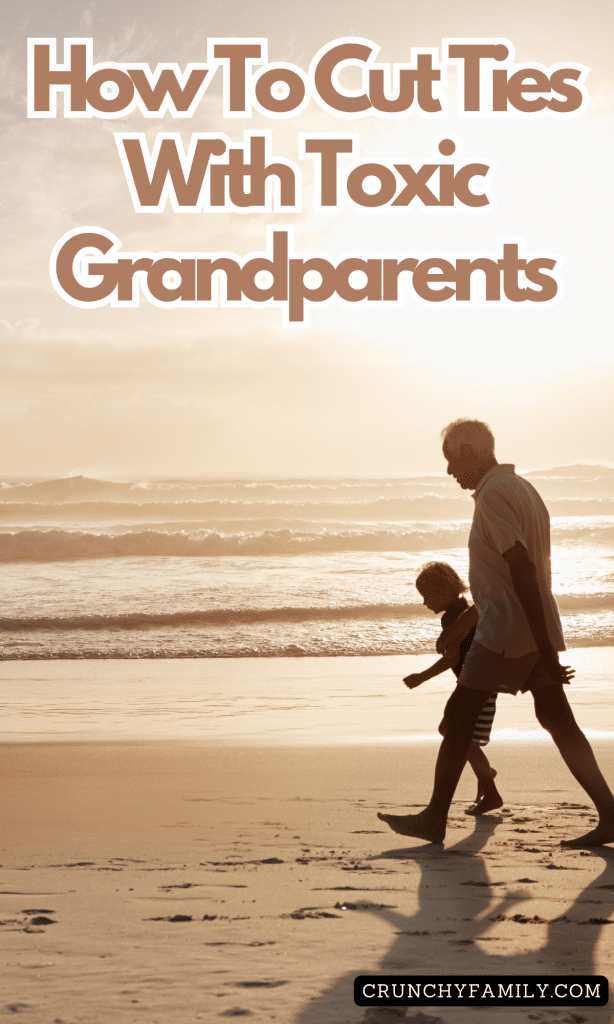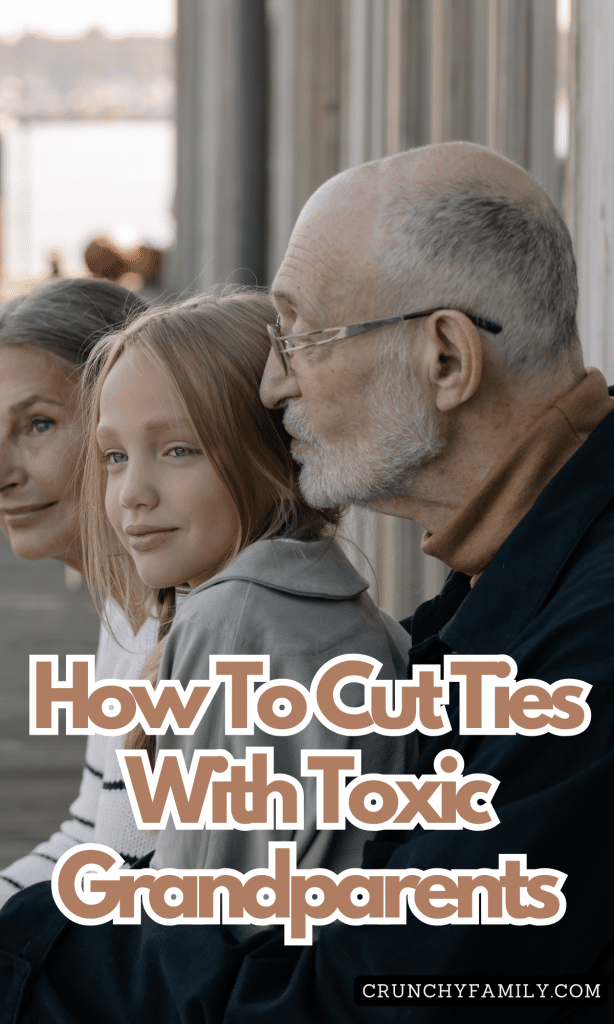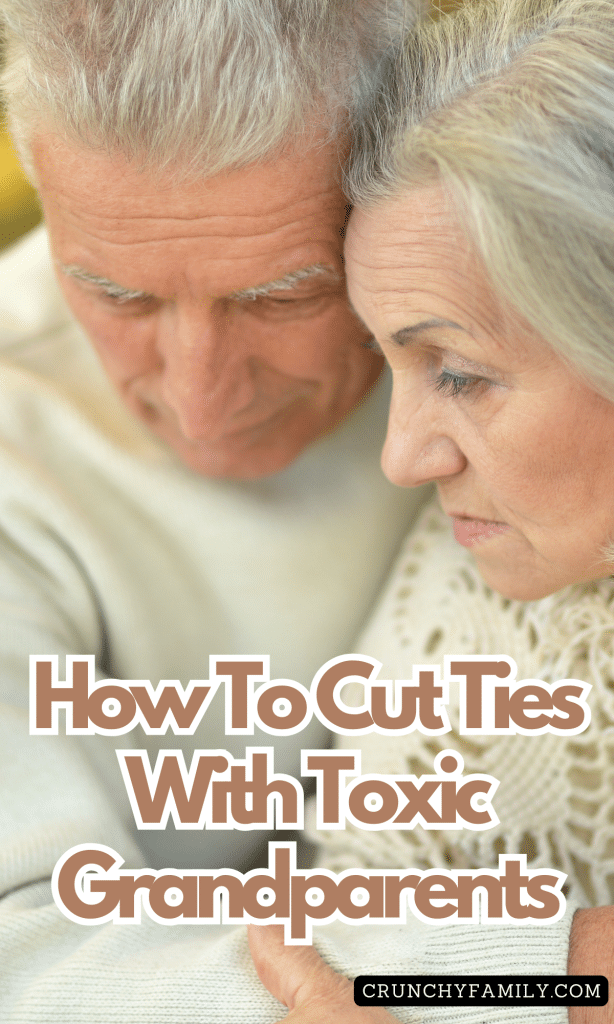I want to talk about something deeply personal and often challenging: dealing with toxic grandparents. I’ve been there myself and I decided to cut ties with my daughter’s grandparents due to their toxic behavior.
But I understand that this is not a feasible solution for many families. So, let’s explore how to set healthy boundaries with toxic grandparents and other toxic family members, ensuring the well-being of your entire family.

Before we explore setting boundaries, it’s essential to identify the signs of a toxic grandparent. Toxic behavior can manifest in many ways, from verbal abuse and emotional manipulation to undermining your parental authority and dismissing your parenting decisions. Look out for these red flags of toxic grandparents:
- Emotional Abuse: This includes any behavior that belittles, shames, or manipulates a child or their parents.
- Undermining Parenting: Constantly questioning or overriding your parenting decisions.
- Narcissistic Traits: Exhibiting narcissistic personality disorder characteristics, such as a lack of empathy and an excessive need for admiration.
- Manipulative Tactics: Using guilt, fear, or other manipulative tactics to get their way.
- Disrespecting Boundaries: Ignoring or violating the clear boundaries you set for your own family.

Dealing with toxic people, especially toxic grandparents, can have a profound negative impact on your mental health and that of your children. It can lead to low self-esteem, anxiety, and strained family relationships.
For adult children, confronting a toxic parent or grandparent can be particularly challenging, as it often involves revisiting old wounds and navigating a complex web of emotions.
So, what’s the best way to handle a toxic grandparent? The key is setting and maintaining healthy boundaries. Here’s how you can do it:

- Communicate Clearly: Have a frank discussion with the offending party. Express your concerns about their behavior and its impact on your child’s life.
- Establish New Boundaries: Set specific limits on what is acceptable and what is not. This might include rules about screen time, verbal interactions, or spending time with your children.
- Control of the Situation: Ensure that you maintain control of the situation. Don’t allow toxic grandparents to dictate terms or undermine your parental authority.
- Seek Professional Help: If the situation doesn’t improve, consider seeking help from a family therapist or a licensed marriage counselor. They can offer coping strategies and mediate discussions.
- Prioritize Your Child’s Needs: Always act in the best interest of your child. If a grandparent’s behavior is causing harm, it’s your duty to protect your child, even if it means limiting contact.
Navigating toxic territory with narcissistic grandparents or other toxic family members can be emotionally draining. Here are some coping strategies to help you and your family manage:

- Build a Strong Support System: Surround yourself with supportive friends and family who understand your situation.
- Stay Consistent: Consistency is key when enforcing boundaries. Don’t waver, even if the toxic person tries to manipulate you.
- Focus on Positive Impact: Encourage and reinforce the positive influence of good grandparents and other family members.
- Educate Your Children: Help your kids understand why certain behaviors are unacceptable and teach them how to stand up for themselves in a respectful manner.
- Limit Exposure: In extreme cases, it may be necessary to limit your child’s exposure to toxic grandparents to protect their mental health and well-being.
Cut Ties

In some cases, despite your best efforts to set boundaries and manage the toxic behavior, you might find that the situation does not improve. The toxic behavior of the grandparents continues to persist, undermining your parental authority, and causing distress to you and your children. This is when you need to consider the difficult decision of cutting ties.
Cutting ties with family members, especially grandparents, is a decision charged with emotional complexity. It’s not a step to be taken lightly, as it can have far-reaching implications for the entire family. This decision often comes after a long time of enduring harmful behavior, multiple attempts at setting new boundaries, and recognizing the signs of a toxic grandparent that are impossible to ignore.
Consider the negative impact the toxic behavior has on your family. Ask yourself these questions:

- Is the toxic behavior causing emotional or mental harm to my children?
- Are the grandparents’ actions undermining my authority as a parent?
- Is there a lack of empathy or understanding from the grandparents regarding our family’s needs and boundaries?
- Have there been instances of verbal abuse, emotional manipulation, or other forms of emotional abuse?
If the answer to these questions is yes, and despite your best efforts, the toxic behavior persists, it may be time to protect your family by cutting ties.
Your primary responsibility is to the well-being and mental health of your own children. Sometimes, protecting them means making hard choices, including limiting or ending contact with toxic grandparents.
This is especially true if their behavior is causing significant stress, anxiety, or other negative effects on your children.

- Communicate Your Decision: When possible, communicate your decision to the grandparents calmly and clearly. Explain the reasons behind your decision and how their behavior has affected your family.
- Prepare for Reactions: Understand that this decision may provoke strong reactions. Toxic people, including narcissistic grandparents, may react with anger, denial, or attempts at further manipulation. Stay firm and consistent in your decision.
- Establish Support Systems: Surround yourself with supportive friends and family members who understand and respect your decision. Lean on them for emotional support during this challenging time.
- Focus on Healing: After cutting ties, focus on healing and rebuilding your family’s emotional health. Consider continuing therapy to address any lingering effects of the toxic relationship and to strengthen your family bonds.
Cutting ties is not about punishing the grandparents but about protecting your family from ongoing harm. It’s a step toward creating a healthier and more positive environment for your children to grow up in.
While this decision is difficult, it’s made in the best interest of your child’s well-being and mental health. The decision to cut ties should be made carefully and thoughtfully, always prioritizing the health and happiness of your own family.

Dealing with toxic grandparents or any toxic family member is undoubtedly challenging. However, by recognizing the signs of toxic grandparent behavior, setting clear boundaries, and seeking professional help when needed, you can protect your family from the negative impacts of such relationships.
Every family situation is unique, and the best way forward will depend on your specific circumstances. Stay strong, prioritize your children’s needs, and remember that a healthy relationship is always worth the effort.
Related reads:
1 thought on “How To Cut Ties With Toxic Grandparents?”